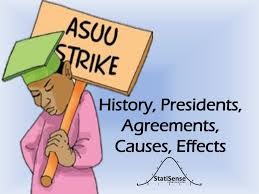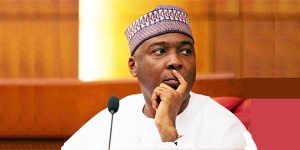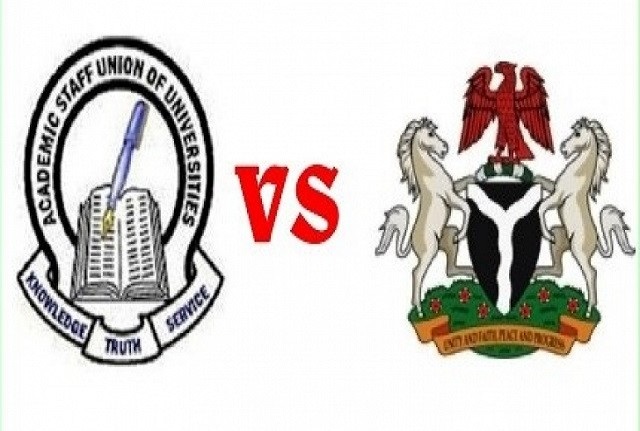
 Universities in Africa remain a battleground. Makerere University in Uganda, a senior member of the club of the most prestigious universities in Africa in those days is currently under lock and key. The reason is that the academics have not been paid for nearly a year. For over three decades running in Nigeria, the universities could be said to have remained shut more than they have remained open. No Nigerian leader in all these years has been able to identify and solve the problem or, better still, the solution to the problem as they see it is to keep it permanently on the burner. From the Babangida regime where it escalated to the short lived Shonekan government and on to Abacha, Abdulsalami, Obasanjo and Jonathan, none had a solution. The late Umaru Musa Yar’Adua is not included on the list because he adopted a completely different approach whose outcome rests in speculation as his illness and subsequent death affected the progression.
Universities in Africa remain a battleground. Makerere University in Uganda, a senior member of the club of the most prestigious universities in Africa in those days is currently under lock and key. The reason is that the academics have not been paid for nearly a year. For over three decades running in Nigeria, the universities could be said to have remained shut more than they have remained open. No Nigerian leader in all these years has been able to identify and solve the problem or, better still, the solution to the problem as they see it is to keep it permanently on the burner. From the Babangida regime where it escalated to the short lived Shonekan government and on to Abacha, Abdulsalami, Obasanjo and Jonathan, none had a solution. The late Umaru Musa Yar’Adua is not included on the list because he adopted a completely different approach whose outcome rests in speculation as his illness and subsequent death affected the progression.

Prof Ogunyemi, National President of ASUU

New helsmen of the ASUU-FG Conflict and Senate President, Bukola Saraki
The question would then be what accounts for the intractability of the Academic Staff Union of Universities, (ASUU) conflict with the FG. On the surface, the problem is reducible to ASUU’s demand for more money into the university system. ASUU wants the university system to be insulated from budgetary volatility. For fear that the government would incur the wrath of the IMF whose conditionalities activated by its Policy Support Instrument, (PSI) disallows such, ASUU made the case for the government to obtain the money from state institutions such as the CBN, the NNPC, the PTDF, the NCC and a few others to implement the ASUU-FG Agreement.
Obviously, successive governments remain unwilling to oblige. One argument is that government might truly not have the money to spare. Critics, however, wonder how the government that has no money to fund world class universities had enough money years back as for the Central Bank of Nigeria, (CBN), for example, to sink nearly N3 trillion into bailing banks out of crisis. This is besides other bail outs and generous donation offered by the CBN over the years. The question is whether there would be anyone to run the banks, the medical system, the military and even the government if there are no universities.
A second argument is that the IMF/World Bank and their agents in the engine rooms of power in Nigeria disapprove infusing such money into the national university system. Fundamentally, the IMF and the World Bank do not accept that African countries need universities. They would prefer everyone goes to polytechnics and study marketing, accounting, computer Science and similar courses so that they can calculate the profits of multinational corporations with dexterity. Universities are not necessarily superior to the polytechnics but they have different orientations. Universities produce trouble makers, people who ask questions and demand answers. Nowadays, the IMF and the World Bank do not come out to say that Africa does not need universities anymore. No, they have recanted. What their intellectuals in government argue is that pumping such amount into the university system in Nigeria, for instance, would cause inflation.
More importantly, funding the universities effectively will leave Nigeria and African countries with nothing else to pay her debts to international creditors and that will challenge the essence of the IMF and the World Bank. They are not interested in how tiny Cuba could produce world class medical doctors, with enough to export to other ‘Third World’ countries in addition to providing a sophisticated national health care system for their own citizens. Goodluck Jonathan’s ‘Prime Minister’, Mrs Ngozi Okonjo-Iweala even told the country pointblank that Nigeria had no money to fund education. And nobody chastised her although there is a paradox on the ground there in that her own father is the author of a document considered a very progressive framework for resolving the university crisis across Africa. It is said to be the key document used to revitalize university system in Ghana where Nigerians send their children today without any sense of embarrassment. Since Mrs Iweala could not have been ignorant of such an alternative framework to her own lack of patriotism, the country ought to have put that on record. Only Festus Iyayi, the late former president of ASUU did.
This is the background for what might be called Nigeria’s own 30 year war although the 30 year war in Europe was on a completely different conflict issue. In fact, this has exceeded thirty years. Like all wars, it has left consequences in its wake. Graduates of Nigerian universities are broadly rated as unemployable. Even by the World Bank. Ironically, the parents of Nigerian undergraduates do not see ASUU as fighting the battle the parents should have been out fighting. Parents in Nigeria are more concerned with universities remaining open rather than what sort of education their children are receiving and in which environment. And not even the government whose own investigation shocked President Goodluck and his cabinet the day it was presented about the degree of decay. Is it possible that something is fundamentally wrong with the specie called Nigerians in their collectivity? Does anything exist that might shock the Nigerians? And the Nigerians here include the students who also join in upbraiding ASUU. The students of nowadays are such a complete contrast of yesteryears who, in Bayero University in 1995, acted as the enforcers of the ASUU strike action that year even as they longed to graduate. The students of nowadays do not see any links between ASUU strike actions and their own future.
Many reasons must account for this, one of which must be ASUU’s dismal failure in explaining the issues in conflict in a way that everybody can understand them holistically. It one newspaper advertorial is an unsuitable approach. Perhaps, it is also time for ASUU to bring some reflexivity in. while many give it automatic solidarity for the patriotism of its cause, many others and this includes very decent senior citizens do not understand why ASUU is not as vocal in fighting unprincipled relations between academics and female students. Many senior journalists have heard this complaint at the most serious quarters and it is a crisis of moral authority for ASUU struggle. The belief is that it is too rampant to be a threat to the social fabric. Those who raise this issue do not accept that consent excuses all of it.
Extrapolating from his handling of one of the intractable industrial conflicts when he was chairperson of the Nigerian Governors’ Forum, some labour leaders speak of Bukola Saraki as possessing something close to wizardry in problem solving. The world is watching how the current phase of the ASUU palaver proves or disproves that wizardry.




























